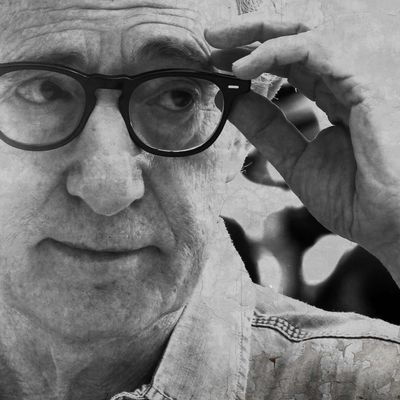
Let me tell you right off the bat, just so you know which of your Facebook friends are going to get self-righteous when you post this article: I believe Dylan Farrow. On Sunday, she described in detail the ways that her adoptive father Woody Allen abused her when she was 7 years old. Today her estranged brother, Moses, joined the chorus characterizing her statement as a vengeful lie. Yes, she’s the daughter of a beloved film director and she’s making very serious allegations. No, I don’t know the family personally.
Here’s why I believe Dylan Farrow: While all the caveats about not knowing the family personally apply, I do know several women who have experienced sexual violence that is not dissimilar from what Dylan describes. I don’t know a single woman who has made up lies about such violence in order to gain something. And, probably just as important, I don’t know any men who have been falsely accused of committing such crimes.
When you don’t have firsthand knowledge of an incident — if you’re a casual acquaintance or an occasional collaborator or just a stranger watching the details fan out over your social-media feeds — where you come down on such accusations boils down to which experience you identify with more. Do you know more people who feel they’ve been falsely accused of using their power to harm others, intentionally or unintentionally? Or do you know more people who have been on the receiving end of that harm? Even those who feign neutrality on these cases are taking a stance. As Aaron Bady writes at the New Inquiry, “If you are saying things like ‘We can’t really know what happened’ and extra-specially pleading on behalf of the extra-special Woody Allen, then you are saying that his innocence is more presumptive than hers.” By this standard, a lot of people — many of them journalists — are frighteningly quick to presume women are guilty when they speak out against older, powerful men.
In a wholly different case this week with similar implications, journalist Arikia Millikan published an essay in which she described a creepy formative experience with an older male reporter. She kept him anonymous and changed some identifying details, which led Gawker to accuse her of “making shit up.” Her article had many male readers screaming, “Just name names, already!” as if they’d been completely ignoring the headlines lately, which are rife with lessons in why women don’t. We’ve all watched the Internet shame machine go to work on Dylan Farrow.
My friend Adam Serwer once made the astute observation that most white people “can only relate to racial discrimination in the abstract. What white people can relate to is the fear of being unjustly accused of racism.” The lesson translates to cases of sexual assault and harassment. Those of us who have been forced to personally cope with powerful men behaving badly are certain that the accusers in these situations are worth listening to. “These are not stories we tell for fun, attention or revenge,” tweeted Lena Dunham. There are many women like us working in media, but we’re outnumbered — or definitely outranked — by men who are inclined to relate to the experience of being accused.
It’s safe to say that, in the age of superficial social-media accountability, many male journalists have felt falsely accused or unfairly attacked at some point — for their participation in all-white, all-male literary events, for their failure to hire or advocate for women in their profession, for a “lighthearted” tweet that some people thought was sexist. I think it’s also safe to say that far fewer have experienced routine sexual harassment or been sexually assaulted. This matters because, historically, it’s journalists who have been responsible for asking questions about the private lives of public figures. They write the profiles illuminating the “myth behind the man,” and are the first to start making phone calls when there are whispers about wrongdoing. Of course there are powerful male allies who bring survivors’ stories to light and treat them with respect: Nicholas Kristof published Dylan Farrow’s firsthand account, and reporter Jim DeRogatis reminded music fans about R.Kelly’s misdeeds after most of us had chosen to forget. But they are exceptions. It’s no coincidence that many of the loudest voices questioning women’s motives in coming forward belong to male journalists.
I used to have a very elaborate inside joke with a few other women in media. It was called “The Island,” and the narrative went like this: All of the editors we know to be sexual harassers or professional bullies are on a plane together, probably headed to an “ideas festival” or “un-conference,” when the plane goes down on a small island. There, they are forced to live out the rest of their days with only each other to harass. In their absence, the rest of us go on to remake the media industry into a creative, forward-thinking, gender-equitable paradise. Fin.
It was funny to picture this scenario, but also sort of a sad coping mechanism. We knew these men were too professionally powerful to really be held accountable for their behavior. “The Island” became a code for telling each other who was a good guy and who was a bad guy — which upper-masthead men actually wanted to mentor us, and which ones just wanted the thrill of having a cocktail with an attractive younger woman under the guise of professionalism: “Is he on ‘The Island’ or not?” Or, “Watch out, that guy’s totally on ‘The Island.’”
Young women have always shared information among themselves about which men in their professional and social circles are creepy, predatory, or outright dangerous. We take notice of how powerful men treat not just us, but our female colleagues — and their own wives and girlfriends. If we don’t like what we see, we stay away from them and tell our friends to keep a wide berth, too.
Among those of us Gchatting about “The Island,” no one was ever surprised to hear allegations of sexual misdeeds by powerful men. As Emily McCombs pointed out with a staggering list at xoJane, successful men of the creative variety have targeted teenage girls for decades with virtually no repercussions or cultural backlash. Dozens of women say their lives were ruined by R.Kelly, and his last record debuted at No. 4 on the Billboard charts. Young models have described abuse at the hands of photographer Terry Richardson for years, and in that time he’s worked with the likes of Barack Obama and Beyoncé. We lauded Roman Polanski at the Oscars and put Bill Cosby in Jell-O commercials.
Eh. It was so long ago. We weren’t there. Who’s to say what really happened? I try not to think about it. There’s a level of fatigue. Maybe, as Roxane Gay posited, our willful ignorance is explained by the fact that, if we really grappled with how common sexual harassment and assault really are, we’d never want to get out of bed in the morning. I’ve said it before: If I gave up on every artist who’s committed or advocated acts of violence against women, I’d have to move to a cave. It’s depressing to think about how crowded “The Island” truly is.
But there are also glimmers of hope that these guys’ legacies and reputations are no longer unassailable. While the Internet is by no means an equalizer, it’s diminished the gap between famous men’s power and that of their victims. Women have been able to anonymously speak their truth outside the confines of their closed professional networks to warn women they don’t know personally and chastise the people who enable their abusers. If everyone’s aware of a controversy, viewers/listeners/buyers/readers might feel obligated to take more of a deliberate stance in choosing what culture to consume. Even die-hard, stand-by-their-man fans feel compelled to add disclaimers when they promote the work of these guys on Facebook.
There’s a reason “The Island” was always a private joke, never a dramatic op-ed that named names. But I agree with the “name names!” chorus that public knowledge is power. And maybe, as more and more women speak up (even if they keep parts of their story anonymous), journalists and the rest of us will learn to identify more with them than with the powerful men who hurt them. And maybe, just maybe, the men whose names pop up again and again in our private conversations will make headlines for their bad behavior, and they’ll finally pay a price for it.




